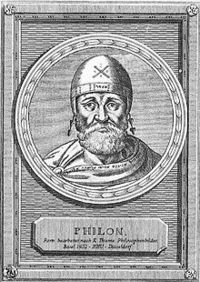Philo
(Dieser Artikel wurde noch nicht aus dem Englischen übersetzt oder enthält noch englische Textpassagen. Bitte beziehe dich vorerst auf die Informationen im englischen Artikel. Klicke dazu in der IntactiWiki-Navigation im Abschnitt "In anderen Sprachen" auf "English".)
Philo of Alexandria (Greek: Φίλων, Philōn; c. 20 B.C.E. – 50 C.E.), also called Philo Judaeus, was a Hellenistic Jewish philosopher who lived in Alexandria, Egypt during the Roman Empire. Philo used philosophical allegory to attempt to fuse and harmonize Greek philosophy with Jewish philosophy. His method followed the practices of both Jewish exegesis and Stoic philosophy. His allegorical exegesis was important for several Christian Church Fathers, but he has barely any reception history within Judaism. He believed that literal interpretations of the Hebrew Bible would stifle mankind's view and perception of a God too complex and marvelous to be understood in literal human terms.
Philo and circumcision
Philo of Alexandria advanced four reasons for circumcision: protection against the "severe and incurable malady of the prepuce called anthrax or carbuncle"; the promotion of the cleanliness of the whole body as befits the consecrated order; the analogy of the circumcised member to the heart (following Jeremiah); and the promotion of fertility. Philo also claimed that circumcision "spiritualizes" the Jewish male by decreasing pride and pleasure, hence enhancing the spiritual persona of the Israelite male (De Circumcisione, 11:210).[1]
He also thought that circumcision should be done as early as possible as it would not be as likely to be done by someone's own free will. He claimed that the foreskin prevented semen from reaching the vagina and so should be done as a way to increase the nation's population.[2]
| ” | Circumcision First of all, it is a symbol of the excision of the pleasures which delude the mind; for since, of all the delights which pleasure can afford, the association of man with woman is the most exquisite, it seemed good to the lawgivers to mutilate the organ which ministers to such connections; by which rite they signified figuratively the excision of all superfluous and excessive pleasure, not, indeed, of one only, but of all others whatever, through that one which is the most imperious of all. – Philo Judaeus (A Treatise On Circumcision)[3] |
Einzelnachweise
- ↑
 (2008).
(2008). Jewish Virtual Library: CIRCUMCISION
. Abgerufen 29. Dezember 2012. - ↑

Male circumcision in the Greco-Roman world
. Abgerufen 29. Dezember 2012. - ↑

A Treatise On Circumcision. Philo Judaeus
. Abgerufen 4. Oktober 2019.
